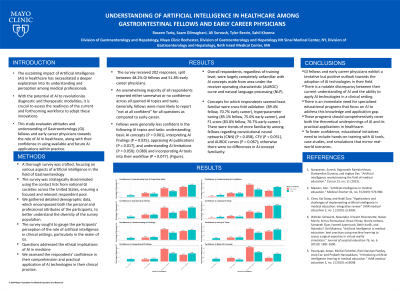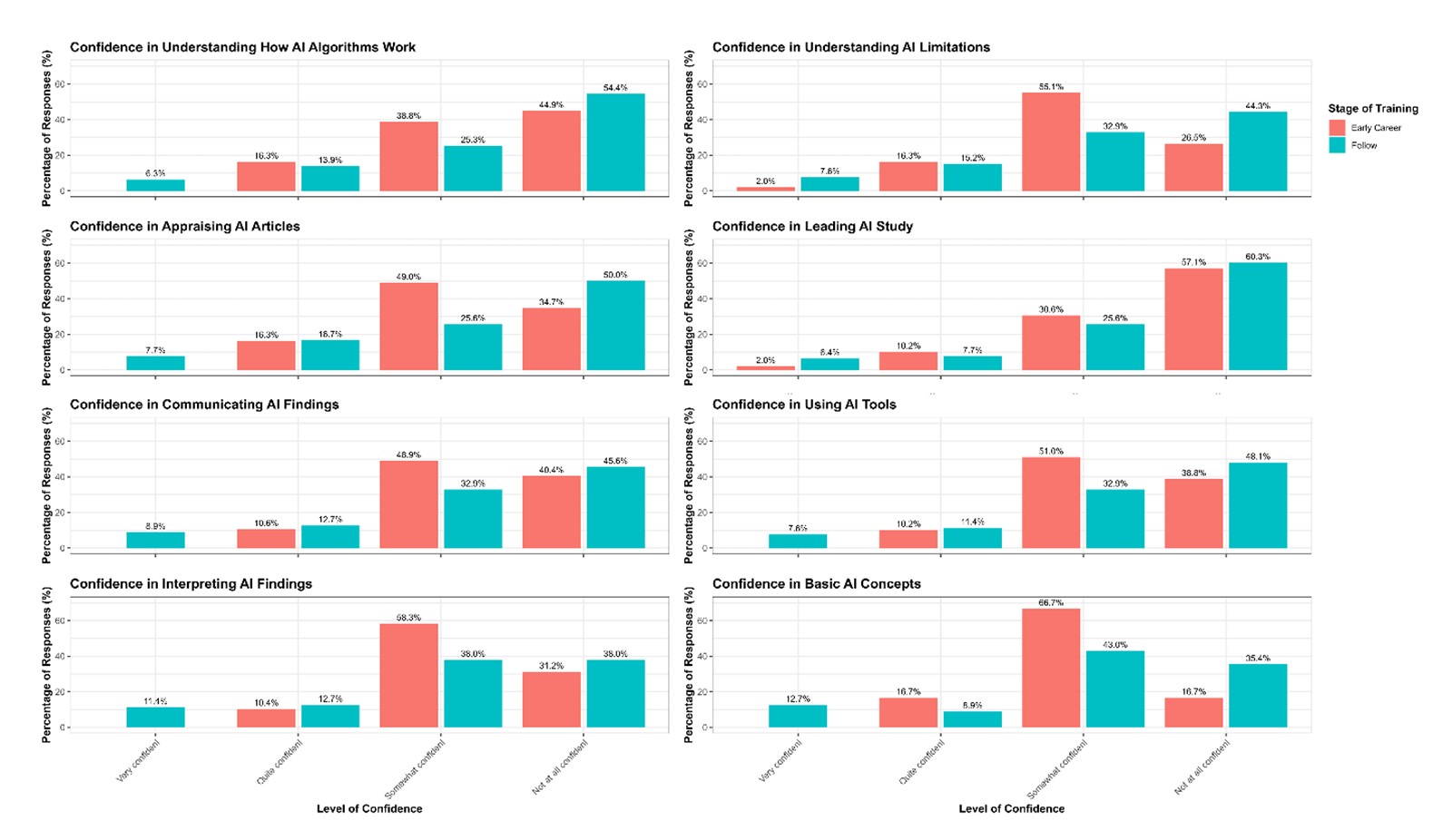Sunday Poster Session
Category: Practice Management
P1498 - Understanding of Artificial Intelligence in Healthcare Among Gastroenterology Fellows and Early Career Gastroenterologists
Sunday, October 27, 2024
3:30 PM - 7:00 PM ET
Location: Exhibit Hall E


Raseen Tariq, MBBS
Mayo Clinic
Rochester, MN
Presenting Author(s)
Raseen Tariq, MBBS1, Saam Dilmaghani, MD, MPH1, Ali Soroush, MD, MS2, Tyler M. Berzin, MD3, Sahil Khanna, MBBS, MS1
1Mayo Clinic, Rochester, MN; 2Icahn School of Medicine at Mount Sinai, New York, NY; 3Beth Israel Deaconess Medical Center, Harvard Medical School, Boston, MA
Introduction: The escalating impact of artificial intelligence (AI) in healthcare has necessitated a deeper exploration into its understanding and perception among medical professionals. This study evaluates understanding of AI in healthcare among gastroenterology fellows and early career gastroenterologists.
Methods: A comprehensive survey was designed and distributed in a targeted fashion using distribution databases from national GI societies within United States. We captured demographic information, professional backgrounds, and respondents' confidence in understanding AI concept. Summary statistics were presented as appropriate for the variable type. Fisher’s exact test was used to measure univariate associations between stage of training (fellow versus early-career) and survey response outcomes.
Results: The survey received 202 responses, split between 48.2% GI fellows and 51.8% early career gastroenterologists. An overwhelming majority of all respondents reported either somewhat or no confidence across all queried AI topics and tasks. Generally, fellows were more likely to report “not at all confident” for all questions as compared to early-career. Fellows were generally less confident in the following AI topics and tasks: understanding basic AI concepts (P = 0.001), interpreting AI findings (P = 0.025), appraising AI publications (P = 0.017), and understanding AI limitations (P = 0.050). There were also trends in lesser confidence among fellows regarding communicating AI findings to patients (P = 0.089) and incorporating AI tools into their workflow (P = 0.077). (Figure 1).<br><br>Overall respondents, regardless of training level, were largely completely unfamiliar with AI concepts aside from area under the receiver operating characteristic curve and natural language processing. Concepts for which respondents seemed least familiar were cross fold validation (89.4% fellow, 70.7% early career), hyperparameter tuning (85.1% fellow, 75.0% early-career), and F1 score (83.0% fellow, 70.7% early-career). There were trends of more familiarity among fellows regarding convolutional neural networks (CNN) (P = 0.058), CFV (P = 0.051), and area under the receiver operating characteristic curves (P = 0.067); otherwise there were no differences in AI concept familiarity.
Discussion: GI fellows and early career gastroenterologists exhibit report gaps in understanding and application of AI technologies. There is an urgent need for targeted AI education programs focusing on the theoretical and practical aspects of AI.

Disclosures:
Raseen Tariq, MBBS1, Saam Dilmaghani, MD, MPH1, Ali Soroush, MD, MS2, Tyler M. Berzin, MD3, Sahil Khanna, MBBS, MS1. P1498 - Understanding of Artificial Intelligence in Healthcare Among Gastroenterology Fellows and Early Career Gastroenterologists, ACG 2024 Annual Scientific Meeting Abstracts. Philadelphia, PA: American College of Gastroenterology.
1Mayo Clinic, Rochester, MN; 2Icahn School of Medicine at Mount Sinai, New York, NY; 3Beth Israel Deaconess Medical Center, Harvard Medical School, Boston, MA
Introduction: The escalating impact of artificial intelligence (AI) in healthcare has necessitated a deeper exploration into its understanding and perception among medical professionals. This study evaluates understanding of AI in healthcare among gastroenterology fellows and early career gastroenterologists.
Methods: A comprehensive survey was designed and distributed in a targeted fashion using distribution databases from national GI societies within United States. We captured demographic information, professional backgrounds, and respondents' confidence in understanding AI concept. Summary statistics were presented as appropriate for the variable type. Fisher’s exact test was used to measure univariate associations between stage of training (fellow versus early-career) and survey response outcomes.
Results: The survey received 202 responses, split between 48.2% GI fellows and 51.8% early career gastroenterologists. An overwhelming majority of all respondents reported either somewhat or no confidence across all queried AI topics and tasks. Generally, fellows were more likely to report “not at all confident” for all questions as compared to early-career. Fellows were generally less confident in the following AI topics and tasks: understanding basic AI concepts (P = 0.001), interpreting AI findings (P = 0.025), appraising AI publications (P = 0.017), and understanding AI limitations (P = 0.050). There were also trends in lesser confidence among fellows regarding communicating AI findings to patients (P = 0.089) and incorporating AI tools into their workflow (P = 0.077). (Figure 1).<br><br>Overall respondents, regardless of training level, were largely completely unfamiliar with AI concepts aside from area under the receiver operating characteristic curve and natural language processing. Concepts for which respondents seemed least familiar were cross fold validation (89.4% fellow, 70.7% early career), hyperparameter tuning (85.1% fellow, 75.0% early-career), and F1 score (83.0% fellow, 70.7% early-career). There were trends of more familiarity among fellows regarding convolutional neural networks (CNN) (P = 0.058), CFV (P = 0.051), and area under the receiver operating characteristic curves (P = 0.067); otherwise there were no differences in AI concept familiarity.
Discussion: GI fellows and early career gastroenterologists exhibit report gaps in understanding and application of AI technologies. There is an urgent need for targeted AI education programs focusing on the theoretical and practical aspects of AI.

Figure: Confidence in artificial intelligence concepts and related tasks, by training status
Disclosures:
Raseen Tariq indicated no relevant financial relationships.
Saam Dilmaghani indicated no relevant financial relationships.
Ali Soroush indicated no relevant financial relationships.
Tyler Berzin: Boston Scientific – Consultant. Magentiq Eye – Consultant. Medtronic – Consultant. RSIP Vision – Consultant. Wision AI – Consultant.
Sahil Khanna: Ferring Pharmaceuticals, Inc. – Grant/Research Support. Finch – Grant/Research Support. Pfizer – Grant/Research Support. Probio Tech, LLC – Consultant. Rise – Consultant. Seres Therapeutics – Grant/Research Support. Takeda – Consultant. Vedanta – Grant/Research Support.
Raseen Tariq, MBBS1, Saam Dilmaghani, MD, MPH1, Ali Soroush, MD, MS2, Tyler M. Berzin, MD3, Sahil Khanna, MBBS, MS1. P1498 - Understanding of Artificial Intelligence in Healthcare Among Gastroenterology Fellows and Early Career Gastroenterologists, ACG 2024 Annual Scientific Meeting Abstracts. Philadelphia, PA: American College of Gastroenterology.
